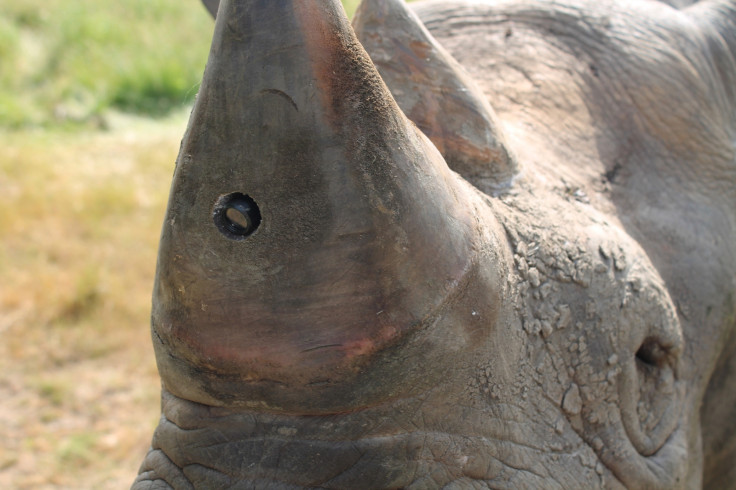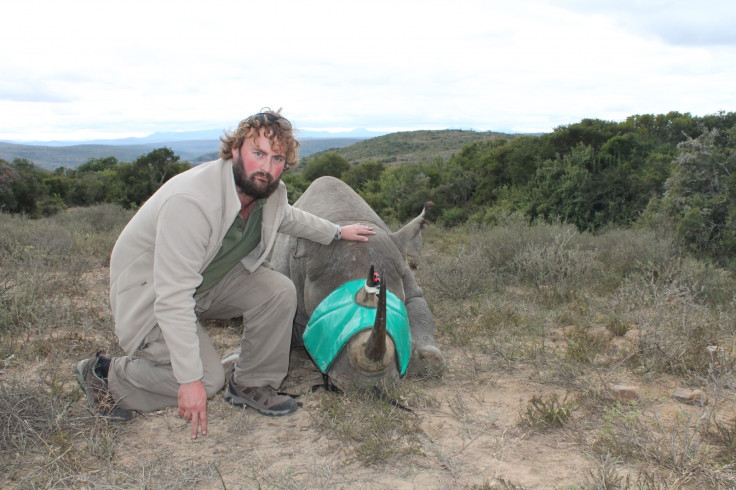Anti-poaching device combines GPS, heart rate and video to stop rhino hunting within seconds

An anti-poaching device that combines satellite GPS, a heart rate monitor and a video camera has the potential to significantly reduce poaching rates over the next decade.
Created by British inventor Paul O'Donoghue, the Protect Rapid (Real-time Anti Poaching Intelligence Device) system can broadcast information on rhino health in real time, meaning a team can be alerted and dispatched to poaching events within seconds.
A study on the device has been published in the Journal of Applied Ecology and rhino experts in South Africa are already backing its roll out.
"We simply don't know where or when poachers might strike. To effectively patrol these vast landscapes requires an army and still poachers could find a way through; they are well organised and equipped, and they will find gaps in almost any defence because the rewards are so great," said Dean Peinke, mammal ecologist for the Eastern Cape Parks and Tourism Agency.
Rhino poaching has risen dramatically in the past decade, with rates in South Africa increasing by over 9,000% since 2007. In 2014, 1,215 rhinos were killed by poachers.
At present, conservationists are fighting a losing battle – the huge area that needs to be monitored means even the most capable anti-poaching teams only arrive at sites when it is too late. This, the authors say, makes poaching "a low-risk/high-gains enterprise".
Supported by the Humane Society International, researchers say the Rapid system should "considerably increase the chances of successful interception, and thereby, escalate the actual and perceived risks of poaching, establishing a powerful new deterrent".
O'Donoghue has worked with endangered black rhino populations for over 15 years. At the current rate, he said, one rhino is killed every six hours in Africa. He said: "There's far too much money at stake to believe that legislation alone can make the difference, we had to find a way to protect these animals effectively in the field; the killing has to be stopped."

His device triggers an alarm linked to the heart rate monitor as soon as a poaching event occurs, while the GPS can pinpoint the rhino to within just a few metres.
"Rangers can be on the scene via helicopter or truck within minutes, leaving poachers no time to harvest the valuable parts of an animal or make good an escape," he said. "You can't outrun a helicopter, the Protect Rapid renders poaching a pointless exercise."
Peinke added: "These devices tip the balance strongly in our favour. If we can identify poaching events as they happen, we can respond quickly and effectively to apprehend the poachers; it's very exciting to be able to work with Dr O'Donoghue and Protect on the first field trials of the Protect Rapid with our own Southern black rhino population."
These devices tip the balance strongly in our favour. If we can identify poaching events as they happen, we can respond quickly and effectively to apprehend the poachers
The Humane Society's Claire Bass said reducing market demand is key to safeguarding wildlife in the long term, but other solutions are needed to stop the current crisis.
"The Protect Rapid could be a game changer in the increasingly desperate fight against poaching, and the technology has the potential to be applied to other critically endangered species including tigers and elephants," she said.
"We are excited to have this opportunity to fund the project and hope other backers will join us to get the technology into the field as quickly as possible."
Ricky Gervais, who has become a prominent animal rights campaigner, also lends his support to the project. He said: "Poachers know full well they can kill rhinos and other animals with almost no chance of being caught. Sometimes they even cut off the animal's horn and half its face whilst it is still alive, it's barbaric. The killing won't stop unless we increase those chances of capture, and the Protect Rapid does just that.
"We finally have the technology to catch these people red handed, and if they know that, then they'll think twice before killing another beautiful rhino. Finally, we might have a fighting chance of saving this astonishing species from extinction. I strongly urge everyone to support this project."
© Copyright IBTimes 2025. All rights reserved.




















